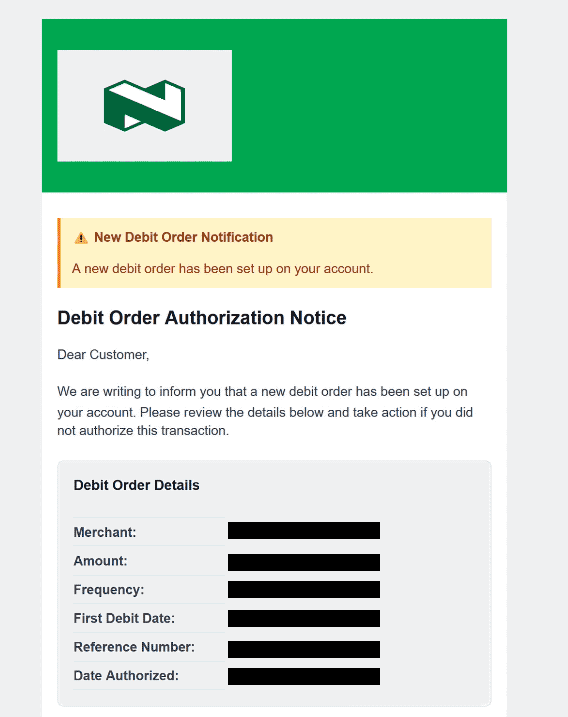Remove “Nedbank – New Debit Order Notification” email
The “Nedbank – New Debit Order Notification” email falls into the phishing category. The email is disguised as a notification from Nedbank and informs you that a new debit order has been set up on your account. The email contains false information about the debit order and asks that you take action to cancel it if you did not authorize the transaction. However, if you were to click on the provided button, you would be taken to a phishing site imitating Nedbank. The site would ask you to log in to your online bank account. If you were to do that, your bank login credentials would be immediately sent to the malicious actors operating this phishing campaign.
The “Nedbank – New Debit Order Notification” email is a phishing scam targeting Nedbank customers to steal their online banking credentials and access their accounts. It goes without saying that Nedbank has no connection to this email. Like many banks, its name is used by cybercriminals to gain unauthorized access to users’ accounts and potentially steal funds.
The email falsely states a new debit order has been set up and provides fake information about the order. The email asks that recipients review the information and cancel the order if they did not authorize it. The email’s purpose is to trick users into wanting to cancel this supposed debit order and clicking on the provided button. Clicking said button will lead to a fake website designed to mimic the official Nedbank site. On this site, users are prompted to enter their online banking login credentials. If provided, the attackers behind this scam can use the information to access accounts and carry out unauthorized transactions or purchases.
Phishing scams like this, aimed at stealing sensitive information such as banking details, are incredibly widespread. Being able to recognize these phishing attempts is thus very important if users want to avoid becoming victims in the future. If you think you may have fallen victim to this scam, contact your bank immediately to report the issue. Acting quickly can help secure your account and prevent unauthorized transactions.
The full “Nedbank – New Debit Order Notification” email is below:
Subject: Debit Order Authorization Notice
New Debit Order Notification
A new debit order has been set up on your account.
Debit Order Authorization Notice
Dear Customer,
We are writing to inform you that a new debit order has been set up on your account. Please review the details below and take action if you did not authorize this transaction.
Debit Order Details
Merchant: –
Amount: –
Frequency: –
First Debit Date: –
Reference Number: –
Date Authorized: –Did you authorize this debit order?
If you did NOT authorize this debit order, please cancel it immediately by clicking the button below. This action will prevent any future debits from this merchant.
CANCEL THIS DEBIT ORDER
Important: If you authorized this debit order, no action is required. The first debit will occur on the date specified above.
For your security, we recommend regularly reviewing your bank statements and debit order authorizations through Nedbank Online Banking or the Nedbank Money app.
Kind regards,
The Nedbank TeamNedbank Limited
Reg No 1951/000009/06. An Authorised Financial Services Provider (FSP 9363).
Signs of a phishing email
Phishing campaigns targeting regular users on a large scale are often generic and lack personalization, which is good for users because such emails are very easy to identify as malicious. In contrast, more sophisticated phishing attacks are aimed at high-profile individuals and/or companies whose personal details may be accessible to malicious actors. These targeted emails often include specific information, making them appear more credible and increasing the likelihood of users falling for them. Fortunately, most regular users encounter predominantly generic phishing attempts, which are not difficult to identify.
The “Nedbank – New Debit Order Notification” phishing email is a clear example of a generic phishing attempt. From the very first line, it is evident that this email is fraudulent, as it addresses the recipient as “Customer”. Legitimate emails from banks typically address customers by name, while mass phishing emails use generic words like Users, Member, or Customer because malicious actors neither personalize the emails nor have access to personal information.
Another clear indicator of a phishing email is a generic sender’s email address. Users should always inspect the sender’s address carefully. If it appears random or unfamiliar, especially when claiming to represent a reputable company, it is likely a phishing attempt. More advanced phishing campaigns may use email addresses resembling legitimate business domains. Users can verify the authenticity of a sender’s address by conducting a quick online search. Users should also keep in mind that malicious actors can use spoofing techniques to imitate legitimate email addresses.
Site Disclaimer
WiperSoft.com is not sponsored, affiliated, linked to or owned by malware developers or distributors that are referred to in this article. The article does NOT endorse or promote malicious programs. The intention behind it is to present useful information that will help users to detect and eliminate malware from their computer by using WiperSoft and/or the manual removal guide.
The article should only be used for educational purposes. If you follow the instructions provided in the article, you agree to be bound by this disclaimer. We do not guarantee that the article will aid you in completely removing the malware from your PC. Malicious programs are constantly developing, which is why it is not always easy or possible to clean the computer by using only the manual removal guide.

